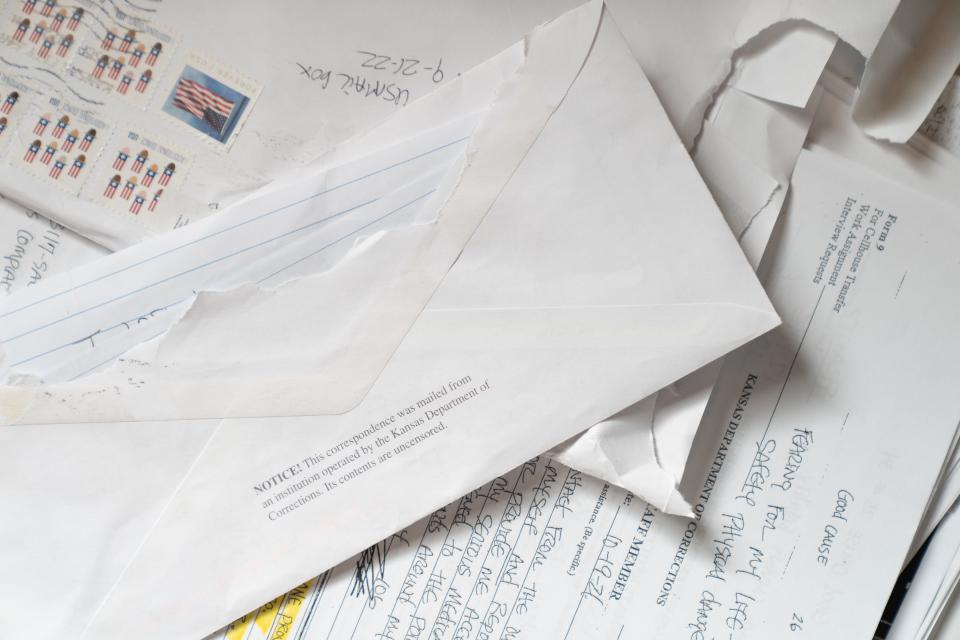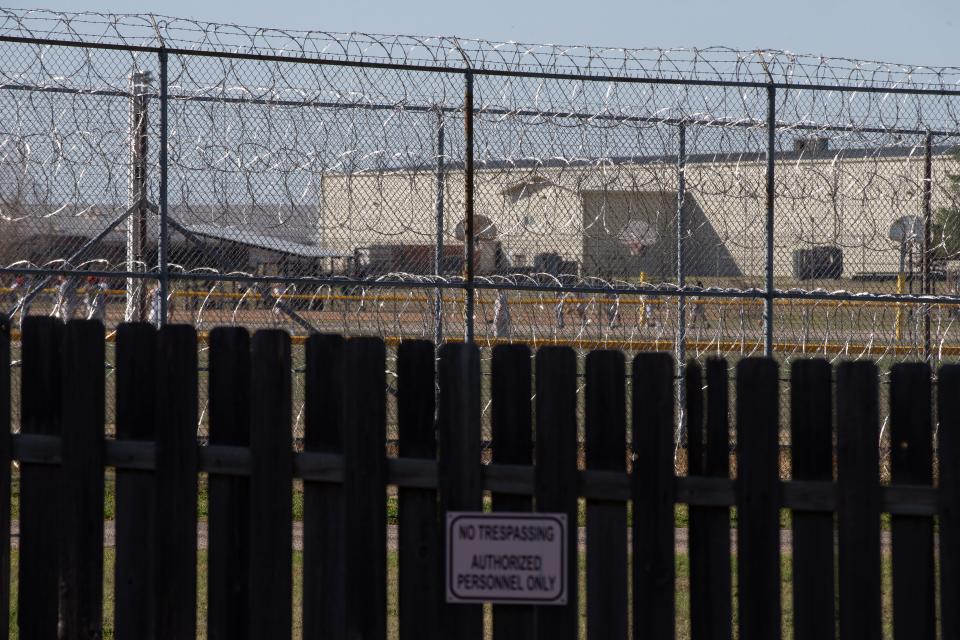Why prisoners and their attorneys are pushing back against Kansas letter-scanning policy
At Lansing Correctional Facility, the phrase "you've got mail" has gotten increasingly complicated.
For months now, Kansas' prison system has been opening mail, scanning it and passing along a photocopy to inmates.
But for Audry Piert, this doesn't mean that her loved one at Lansing is actually getting his mail days in the manner promised by the Kansas Department of Corrections. Of the five letters she has sent in recent months, three either never reached her loved one or the scanned copy was so faint as to be indecipherable.
"This is the most affordable, way for people to communicate," Piert said. "A lot of these families are struggling, of course, with the times, but also prison phone calls and canteen and the cost of everything. It's hard, so they depend on letters.
"This has basically broken communication."

KDOC has said the policy, formally introduced statewide earlier this year, is a way of limiting the possibility that drugs could be mailed into prisons.
But inmates and their families say the mail scanning process has been sloppy and leads to crucial messages being difficult to read or incomplete.
And attorneys, who frequently send mail to clients in prison regarding their cases, say the procedures for their messages raise concerns about confidentiality and privacy.
But Wanda Bertram, a communications specialist with the Prison Policy Institute who has researched mail scanning programs, noted there is a human impact, too.
"It cuts incarcerated people off from a pretty vital lifeline to the outside world," she said. "Like 60% of incarcerated parents use the mail to keep in touch with their kids. You're taking something really important away, and obviously, that venue for communication is not gone. You can still write letters, but it adds a lot of delays to the process."
Kansas following national trend in scanning prison mail
Kansas isn't alone in scanning inmate mail.
The Prison Policy Initiative identified at least 14 states that have started scanning inmate mail and providing them with photocopies. Many county jails, including in Shawnee County, have a similar system, providing either a physical printout of the mail or an electronic scan that can be perused on a tablet.
In Kansas, the move to roll out the policy statewide came after a prolonged trial run at Ellsworth Correctional Facility, starting in 2021. Gov. Laura Kelly's administration requested and was granted $1.1 million in the state budget to fund equipment and staffing to expand the work.

The stated intent of the program is to combat drugs, which have been on the rise in state prisons.
Prison officials say this can include cases where drugs, such as the synthetic drug K2, can be soaked into sheets of paper and sent into prisons via the mail. This has even included instances where drugs were mailed from an address pretending to be the Kansas attorney general.
KDOC records show the number of individuals in state prisons who were discovered in an "altered state of consciousness" spiked in 2022 to 616, more than 2021 and 2020 combined. In 2023, there have already been 357 inmates deemed to be under the influence of drugs or alcohol as of mid-July.
The number of deaths attributed to drugs or alcohol also rose in 2022 to five, though there hasn't been a death yet in 2023.
Rep. Stephen Owens, R-Hesston, said safety in the corrections system for inmates and staff has to be paramount.
"If they can keep drugs out of our prisons, that obviously eliminates a number of problems from substance use-related issues to anger issues to gang violence that all revolves around drugs," said Owens, chair of the House Corrections and Juvenile Justice Committee,. "I believe it will all be beneficial."
Inmates and families argue mail policies not being followed in Kansas
David Thompson, a spokesperson for KDOC, said there are 17.5 mailroom workers across the state prisons and the agency is set to begin hiring 12.5 new positions soon, powered by funds in the state budget.
"This process is a tool that further ensures the health and safety of our residents and staff," Thompson said in an email. "It was successful in intercepting contraband during the pilot, and KDOC expects that success to continue with the process implemented."
While Owens said legislators were presented with data showing the Ellsworth pilot program successfully blocked drugs from entering, the Prison Policy Institute's Bertram said officials concerned about drugs in prison could more effectively combat the problem by expanding drug treatment programs and other mechanisms.
When asked, KDOC didn't provide data to The Capital-Journal regarding the effectiveness of the pilot program.
"It probably doesn't do much to curb drug contraband," Bertram said of mail scanning.
The policy states mail should be examined by staff before being photocopied, either in black and white if it is a letter or color if it is a photograph. The copy should be delivered to an inmate within 24 hours and the originals are then dated, stored for 60 days and, ultimately, destroyed.
But Piert, who has a loved one at Lansing, said this protocol isn't being followed. Letters written on the front and back sides of a piece of paper will only have one side copied. Photographs aren't being scanned in color. And delays mean the process can take days, rather than hours, for mail to be passed to an inmate.
Inmates have echoed these concerns in messages to The Capital-Journal.
"It was an immediate issue and has not gotten any better," Piert said.
Legal mail implications in Kansas raise separate concerns
For legal mail, the mail scanning process is supposed to work a little differently, as those communications are covered under attorney-client privilege.
Staff are required to inspect any mail from an attorney for odd colors or smells. If none are detected, they are to open the parcel in front of the inmate, inspect it for contraband and then give it to the inmate to scan themselves before the original is destroyed.
But Jennifer Roth, a public defender with the Kansas Appellate Defender Office, said this policy, even if followed to the letter, left her with concerns about the civil liberties and legal protections for clients.
"I want to know how you screen a piece of mail and not read it," she said. "How do you do that and not see the legal mail that's supposed to be confidential?"
Roth said she and her colleagues in the Kansas Appellate Defender Office likely send more mail to inmates in prison than any other attorneys in the state.
In a given year, more than 500 of the office's clients will be in a prison and they will get a torrent of mail, including briefs filed on their behalf, court rulings and responses to any questions they might have.
Meanwhile, she said it has gotten tougher for attorneys to talk to their clients over the phone.
In 2022, KDOC implemented a new requirement that attorneys wishing to speak on a secure call with a client must fill out a form in order to do so. Inmates must also include the attorney on their list of approved callers and pay for the phone call, which in Kansas costs 14 cents per minute.
Taken in tandem, Roth said, it was becoming more difficult for attorneys to communicate securely with the people they represent.
"There are giant hurdle hurdles to confidentially communicating with clients," she said. "And, in fact, it's not possible in writing apparently."
Could legal challenge emerge to Kansas mail scanning?
Opponents of prison mail scanning policies in other states haven't gone down without a fight.
In March, an advocacy group filed suit against a California county jail, which requires mail be sent to a third-party contractor, where it is digitized and provided to inmates via a tablet.
The Pennsylvania prison system, meanwhile, agreed to stop screening inmates' legal mail in a settlement agreement over a federal lawsuit in the state.
Thompson, of KDOC, said outside groups were consulted in crafting the policy, although Roth said her agency wasn't one of them.
She vowed to press to change or eliminate the protocols moving forward.
"I think I should have done something sooner," Roth said, "and I'm definitely going to do something now because this is impacting our relationship with our clients and our ability to give them the constitutional rights to which they're entitled."
This article originally appeared on Topeka Capital-Journal: Kansas prison mail, scanned to reduce drugs, has civil rights concern

